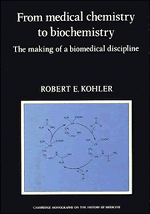Book contents
- Frontmatter
- Contents
- 1 Introduction: On discipline history
- 2 Physiological chemistry in Germany, 1840–1900
- 3 Physiology and British biochemists, 1890–1920
- 4 General biochemistry: the Cambridge school
- 5 European ideals and American realities, 1870–1900
- 6 The reform of medical education in America
- 7 From medical chemistry to biochemistry: the emergence of a discipline
- 8 Unity in diversity: the American Society of Biological Chemists
- 9 The clinical connection: biochemistry as applied science
- 10 Chemical ideals and biochemical practice
- 11 Biological programs
- 12 Epilogue: Toward a molecular biology?
- Location of archival sources and abbreviations
- Notes
- Index
1 - Introduction: On discipline history
Published online by Cambridge University Press: 07 October 2011
- Frontmatter
- Contents
- 1 Introduction: On discipline history
- 2 Physiological chemistry in Germany, 1840–1900
- 3 Physiology and British biochemists, 1890–1920
- 4 General biochemistry: the Cambridge school
- 5 European ideals and American realities, 1870–1900
- 6 The reform of medical education in America
- 7 From medical chemistry to biochemistry: the emergence of a discipline
- 8 Unity in diversity: the American Society of Biological Chemists
- 9 The clinical connection: biochemistry as applied science
- 10 Chemical ideals and biochemical practice
- 11 Biological programs
- 12 Epilogue: Toward a molecular biology?
- Location of archival sources and abbreviations
- Notes
- Index
Summary
Histories of the scientific disciplines are not new, but in recent years historians of science have begun to write them in a new way. Older histories were often written by scientists turned historians and were insiders' accounts of the accumulation of more perfect knowledge. They did not inquire why the world of knowledge is divided up as it is, or how it got that way, any more than naturalists before Darwin's generation worried about the origin and extinction of species. There was no particular reason for scientist historians to see how their disciplines were shaped by processes of social and economic adaptation and competition. Disciplines were the framework for descriptive natural histories of knowledge, not for analyses of the evolution and perpetuation of social forms.
Disciplines are political institutions that demarcate areas of academic territory, allocate the privileges and responsibilities of expertise, and structure claims on resources. They are the infrastructure of science, embodied in university departments, professional societies, and informal market relationships between the producers and consumers of knowledge. They are creatures of history and reflect human habits and preferences, not a fixed order of nature. There have as yet been few studies of sciences as institutions, and it is this aspect of the discipline of biochemistry that will concern me here. I will have less to say about biochemistry as a system of ideas than about biochemists' collective efforts to build and maintain their own institutions.
- Type
- Chapter
- Information
- From Medical Chemistry to BiochemistryThe Making of a Biomedical Discipline, pp. 1 - 8Publisher: Cambridge University PressPrint publication year: 1982

